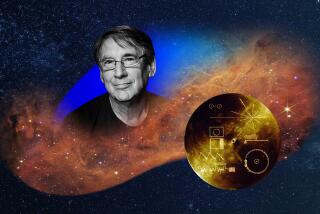BOOK REVIEW / NONFICTION : Unraveling the Mysteries of Our Galaxy : THE ALCHEMY OF THE HEAVENS: Searching for Meaning in the Milky Way, <i> by Ken Croswell</i> ,Anchor Books, $24.95, 340 pages
- Share via
Astronomy is unique. Its practitioners don’t get to do experiments on the objects they study. The stars are out in space, beyond the reach of laboratories and test tubes.
Astronomers can’t touch the stars or hold them or manipulate them to test out new ideas. Astronomers are limited to peering at the objects in the nighttime sky through powerful instruments and observing the light waves and radio waves that those objects give off.
From these data and by using their wits, astronomers piece together a universe of information about stars and galaxies, what they are made of, where they are going and how they came to be.
This is no easy task. As new telescopes and new technologies multiply the amount and complexity of the data, it becomes harder and harder to fit it all into coherent theories. Much has been learned, but much remains unknown. Puzzles and disagreements abound.
How this is done is the theme of “The Alchemy of the Heavens” by Ken Croswell, a very well-written, clearly explained account of how we know what we know about our own galaxy, the Milky Way, and how the bits and pieces of information we have gathered from the sky have been assembled into a grand scheme.
The Milky Way, of course, is our home galaxy. It is that band of fuzzy light that stretches across the sky on a clear, dark night.
We now know that the Milky Way is spiral shaped, that it is some 130,000 light-years in diameter, that it contains hundreds of billions of stars and that our sun and its planets are in one of the arms, about 27,000 light-years from the center of the galaxy.
Nor is that all. Our galaxy has at least 10 satellite galaxies revolving around it, some of which have been discovered only in recent years. And there are billions of other galaxies in the universe.
None of this is static. About 10 new stars form each year within the Milky Way. Throughout the universe, stars are forming and dying, spewing out chemicals in their death throes that are the bases of matter. The elements in your body had their origins in distant stars. (That process is the “alchemy” in the book’s title.)
But Croswell’s book is not just about data and theories.
It is about astronomers as well, who, not surprisingly, turn out to be very human people, motivated by the familiar mix of high-minded and not-so-high-minded goals that we recognize in most areas of endeavor.
Astronomers seek the truth, but few of them are selfless. There is much ego bound up in their work and in their disagreements.
Croswell, a science writer with a Ph.D. in astrophysics, brings his story right up to the latest dispute: How old is the universe?
This is no small matter. For, as Croswell writes, “In recent years, . . . many cosmologists have reached the alarming conclusion that the universe seems to be younger than the Milky Way’s oldest stars, a discrepancy that could threaten big-bang cosmology.”
Since the 1920s, when Edwin Hubble discovered that the universe is expanding, cosmologists have sought to run the clock backward, so to speak, to determine how long ago all of the matter that we observe moving away from us was all together in a single point of mass.
That was the moment of the Big Bang, which is generally thought to have occurred about 15 billion years ago.
But that number is now in dispute.
Other calculations make the universe appear younger. But we know from other evidence that the oldest stars in the Milky Way are indeed about 15 billion years old.
How can this be? Is there a mistake somewhere? And if so, where? In the observations? In the theory? Somewhere else?
This is the hottest question in cosmology today. But it is by no means the only question. For astronomy, the oldest of all the sciences, is still in the process of being made, just like the universe it seeks to understand.
More to Read
Sign up for our Book Club newsletter
Get the latest news, events and more from the Los Angeles Times Book Club, and help us get L.A. reading and talking.
You may occasionally receive promotional content from the Los Angeles Times.








